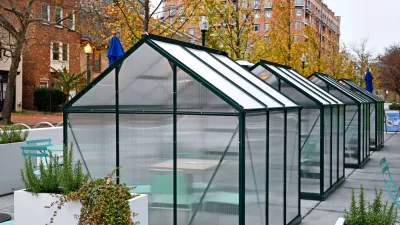A California bill approved in 2018 legalized restaurants to locate in homes, setting the foundation for a new restaurant economy just when communities needed it most.

Farley Elliott reports on the effects of AB 626, approved in 2018 to amend the California Retail Food Code to allow microenterprise home kitchens.
The text of AB 626, authored by Assemblymember Eduardo Garcia (D-Coachella) reads as follows.
This bill would, among other things, include a microenterprise home kitchen operation within the definition of a food facility, and would define a microenterprise home kitchen operation to mean a food facility that is operated by a resident in a private home where food is stored, handled, and prepared for, and may be served to, consumers, and that meets specified requirements, including, among others, that the operation has no more than one full-time equivalent food employee and has no more than $50,000 in verifiable gross annual sales.
Here's how Farley explains the bill:
The newly implemented regulation allows anyone to run a licensed restaurant out of their home kitchen and dining room. No commercial space, no food truck, no ghost kitchen, and no staff is needed — just pull some local permits to get certified by the Riverside County public health office.
According to Farley, AB 626 is having an effect in the Inland Empire, where businesses and residents are hustling to make ends meet, and potentially spurring a dining revolution precisely when it's needed most.
Between stay-at-home mandates, high unemployment, and the still-raging coronavirus pandemic, the entrepreneurial opportunities presented by AB-626 could mean tens of thousands of dollars in the hands of local chefs who feed their communities the food they most want to eat.
Farley explores the city of Riverside County for examples like Barra de Pan in Corona, run by Lucy SIlva and family. The article also includes details about the work of developers in delivering the tech platforms to enable the dining revolution.
FULL STORY: Riverside’s Newly Legal Home Restaurants Look to Revolutionize California’s Food Scene

Alabama: Trump Terminates Settlements for Black Communities Harmed By Raw Sewage
Trump deemed the landmark civil rights agreement “illegal DEI and environmental justice policy.”

Planetizen Federal Action Tracker
A weekly monitor of how Trump’s orders and actions are impacting planners and planning in America.

How Atlanta Built 7,000 Housing Units in 3 Years
The city’s comprehensive, neighborhood-focused housing strategy focuses on identifying properties and land that can be repurposed for housing and encouraging development in underserved neighborhoods.

In Both Crashes and Crime, Public Transportation is Far Safer than Driving
Contrary to popular assumptions, public transportation has far lower crash and crime rates than automobile travel. For safer communities, improve and encourage transit travel.

Report: Zoning Reforms Should Complement Nashville’s Ambitious Transit Plan
Without reform, restrictive zoning codes will limit the impact of the city’s planned transit expansion and could exclude some of the residents who depend on transit the most.

Judge Orders Release of Frozen IRA, IIJA Funding
The decision is a victory for environmental groups who charged that freezing funds for critical infrastructure and disaster response programs caused “real and irreparable harm” to communities.
Urban Design for Planners 1: Software Tools
This six-course series explores essential urban design concepts using open source software and equips planners with the tools they need to participate fully in the urban design process.
Planning for Universal Design
Learn the tools for implementing Universal Design in planning regulations.
Jessamine County Fiscal Court
Caltrans
Institute for Housing and Urban Development Studies (IHS)
City of Grandview
Harvard GSD Executive Education
Toledo-Lucas County Plan Commissions
Salt Lake City
NYU Wagner Graduate School of Public Service





























